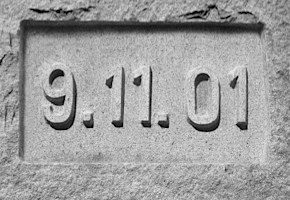It was e arly morning 9.11.2015 when I posted this graphic on Facebook. It was a simple way to say that I had not forgotten the day that ushered our country into a period of intense and stunned mourning. Never would I have imagined that by 3:00 pm that afternoon this graphic would also become a reminder of the day when I was ushered into the deepest mourning. On 9.11.2015 my youngest brother committed suicide.
arly morning 9.11.2015 when I posted this graphic on Facebook. It was a simple way to say that I had not forgotten the day that ushered our country into a period of intense and stunned mourning. Never would I have imagined that by 3:00 pm that afternoon this graphic would also become a reminder of the day when I was ushered into the deepest mourning. On 9.11.2015 my youngest brother committed suicide.
In the days that followed, the pain deepened as my family  realized that there were sketchy details surrounding the last night of my brother’s life and that this could have been a homicide rather than a suicide. It took two months to get the Medical Examiner’s report and to learn that it was indeed a suicide.
Since that day, I have had time to reflect on the process of grief. I have lost both parents and a brother in the last 3 years and so grief is not alien to me but somehow this time I felt like I was in the ring with George Foreman before he started making grills.
It is clear to me that our culture is not at all comfortable with people in emotional pain. It was weird to feel like I needed to apologize for being sad. In several social interactions when I felt like I was drowning just trying to keep it together I would have to reach out and ease the awkwardness of well wishers who could not find right words (there are none) or right things to do to make things right (what could make this right?).
None of us wants to be someone who would crush a bruised reed so here are thoughts I have had about helpful and not helpful things to do when faced with grieving souls.
Helpful:
- Say “I am so sorry for your loss” and nothing more.
- Hold eye contact a few extra seconds rather than averting eyes.
- Give a lingering hug if you are comfortable doing this.
- Sit with the person and allow them to talk about their loved one.
- Find tender words and send them in a card.
- Don’t rush or expect the person to “get over it.” Â Loss leaves a person changed forever.
- Understand the person’s need to withdraw for quiet and stillness.
Not Helpful: (Please read “Never do these things!”)
- Interviewing the person with intrusive and insensitive questions. (nosiness is never helpful…ever…why do  you need to know if the death was expected!?!)
- Offering platitudes or quoting Bible verses. (trust me they are more infuriating than inspiring)
- Telling the person all the stories of people that you know who committed suicide …(sigh)
- Refusing to acknowledge the reality of grief. (this adds insult to injury)
- Offering advice of how to “get over it.” (even on a good day people do not like advice!)
I recently read an article in which the author said, “our culture treats grief like a problem to be solved or an illness to be healed.”  I am so grateful for those who do not see me as a project to be completed or a problem to be fixed. I am grateful for those friends who saw that I was a bruised reed and did not crush me.

